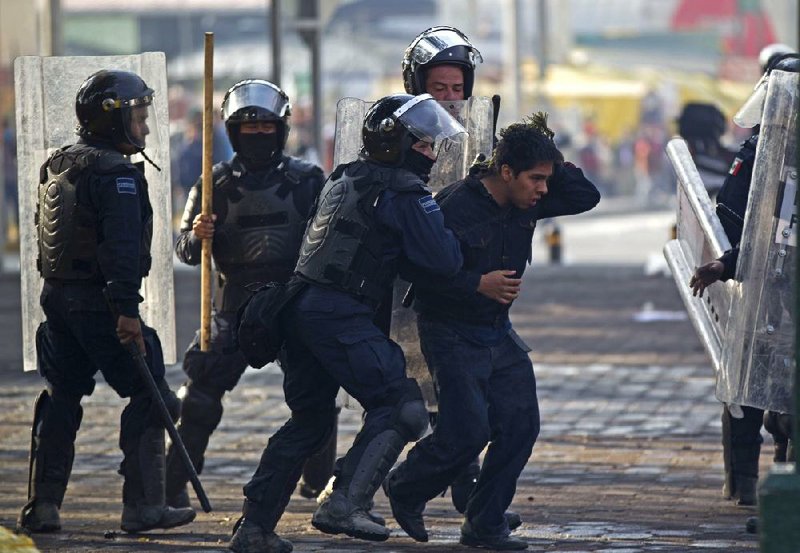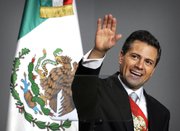MEXICO CITY — Enrique Pena Nieto took the oath of office as Mexico’s new president Saturday promising to return peace and security and to take on the vested interests and sacred cows that have kept a lid on the country’s economic prosperity.
As several hundred protesters threw firebombs at police and smashed plate-glass windows, Pena Nieto marked the return of the Institutional Revolutionary Party with a 13-point plan heavy on old party populist handouts but with legislation designed to boost the economy and modernize the education and justice systems.
In a speech Saturday afternoon before an audience of domestic and foreign dignitaries, including U.S. Vice President Joe Biden, Pena Nieto promised peace and prosperity for Mexicans.
“This is Mexico’s moment,” he declared.
Pena Nieto’s inaugural speech was considered unusual for its heavy emphasis on policy.
“Mexico has not achieved the advances that the population demands or deserves,” he said. “It’s time for us together to break the myths and paradigms and all else that has limited our development.”
Inaugural events were marred all day by protesters opposed to the return of the Institutional Revolutionary Party, also known as the PRI, after a 12-year hiatus.
Inside and outside the congressional chambers where Pena Nieto took the oath of office, his opponents called his inauguration an“imposition” of a party that ruled for 71 years using a mix of populist handouts, graft and rigged elections.
At least 76 people were treated for injuries, including 29 who were hospitalized, as the result of clashes between protesters and tear-gas firing police, the Red Cross said. City officials said 103 people were detained, including 11 minors.
Vandals smashed windows of stores, banks and a hotel and made bonfires of furniture dragged into the streets. One downtown bank office where all the windows were broken had the words “Welcome Pena” painted across the facade in green.
Pena Nieto countered with a speech full of specifics, from creating an integrated crime-prevention program to ending the patronage and buying of teacher positions that rule the public-education system.
He said he will put security at the center of all policies for Mexicans and their families and will work to ensure that roads and cities are again “peaceful areas where Mexicans can travel safely without fear of loss of their liberty or life.”
Pena Nieto said he would increase support for the victims of violence, enact changes to the penal code to attack rampant impunity and move forward on economic changes to remake Mexico into a middle-class society that his advisers say will help reduce crime.
However, he made no promise to dismantle the drug-trafficking organizations, a focus of outgoing President Felipe Calderon’s, but unveiled a sweeping 13-point plan filled with ambitious domestic goals.
Mexico has suffered a spike in violence since Calderon began an offensive against organized crime upon taking office six years ago. Some 60,000 people have been killed by drug violence since then, according to some estimates. While officials first said most of the victims were involved in organized crime, the killings and kidnapping spread to innocent civilians as drug gangs came to rule entire towns and even parts of some states.
Pena Nieto, 46, a lawyer who served as governor of Mexico state, has vowed to continue Calderon’s efforts to work with U.S. law enforcement to quell the violence linked to drug gangs.
Pena Nieto turned to his usual style of result-oriented governing with his list, having started his term as governor with 608 projects that he promised to complete.
The tone of his speech was conciliatory, an attempt to alleviate fears about a return to the party’s autocratic past.
“I will respect every voice,” he said. “I will run an open government that speaks with honesty, seeks opinion, listens to its citizens ... I will be a president who is close to the people.”
Many of his proposals harkened back to the old populist party, promising pensions for the elderly, life insurance for single mothers to support their children through college, broader access to the Internet, a program to end hunger and a new system of passenger trains.
Political analyst Jesus Silva-Herzog Marquez marveled at the specificity.
“It was as if the president took a pencil and drew the train route and how much it would cost to Toluca,” Silva-Herzog said. “It was very concrete, very practical, zero ideology ... this is Pena Nieto. I think Pena Nieto is not a person who thinks in abstract terms.”
Many remain to be convinced.
Before he took the oath of office, leftist congressional members inside the chamber gave protest speeches and hung banners, including a giant one reading “Imposition consummated. Mexico mourns.”
“One word sums up Dec. 1: The restoration. The return to the past,” said Congressman Ricardo Monreal of the Citizens Movement party.
Pena Nieto, who assumed office at a midnight ceremony at the National Palace, campaigned as the new face of the Institutional Revolutionary Party, repentant and reconstructed after being voted out of the presidency in 2000.
Before his public swearing-in at midday, hundreds of opponents banged on tall, steel security barriers around Congress, threw stones, bottle rockets and firecrackers at police. Police responded by spraying tear gas from a truck and used fire extinguishers on flames from Molotov cocktails.
“We’re against the oppression, the imposition of a person,” said Alejandro, 25, a student and protester who wouldn’t give his last name, saying he feared reprisals.
“He gave groceries, money and a lot more so people would vote for him,” the student added, referring to allegations that the Institutional Revolutionary Party gave voters gifts to encourage them to cast ballots for Pena Nieto.
Protesters trailed the new president from the Congress to the National Palace, shouting, “Murderers, murderers!” and trying to break down the barriers set up in the Zocalo, Mexico City’s giant central plaza in front of the palace.
Lines of riot police closed down streets around the Fine Arts Palace near where Pena Nieto gave his speech. Police arrested a few protesters who were throwing rocks or pieces of wood.
Windows of a Sears department store were smashed and its outside walls splashed with white paint.
Despite the protests, the atmosphere inside Congress during the swearing-in ceremony was far less chaotic than six years ago, when a Calderon security unit literally had to muscle him past blockades and protesters to get him into the building so he could take the oath of office after a razor-thin, disputed victory over a leftist candidate.
“It’s a very common misconception to think that the PRI’s return to power means the return of something that is already in history,” Luis Videgaray, who led the president’s transition team and will become treasury minister, said in a recent interview.
When Pena Nieto announced his Cabinet on Friday, it was clear that he had relied largely on Institutional Revolutionary Party stalwarts, including five former governors. But he also placed several young, foreign-educated technocrats, including Videgaray, from his inner circle in prominent positions.
Information for this article was contributed by Mark Stevenson, Olga R. Rodriguez, Adriana Gomez Licon, Michael Weissenstein, Carlos Rodriguez and Juan Diego Quesada of The Associated Press, and by Karla Zabludovsky and Randal C. Archibold of The New York Times.
Front Section, Pages 1 on 12/02/2012


